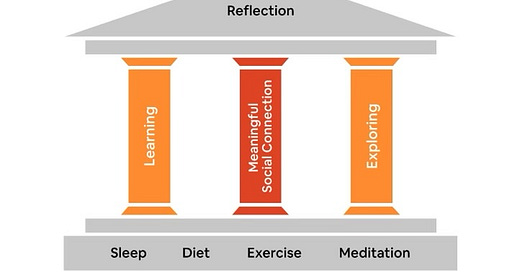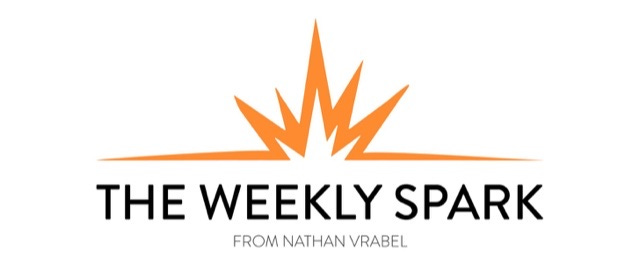Weekly Spark #251: The Power of Positive Thinking
Welcome to The Weekly Spark, my weekly+ newsletter featuring insights on mental and physical wellness, intentional living, and personal development. Since September 2020, I’ve published 251 reflections hoping to motivate myself and others to live more thoughtful, purpose-driven lives.
Recently, I found myself revisiting content from a book that I read in 2016 during my freshman year of college. As I struggled with the transition, I found myself thinking uncharacteristically negative and doubting myself. Was I at the right place? Was I studying the right things? If I was going to work hard and pursue a career in X, was it the best use of my time? Deep questions for an 18 year old, I know. Some days were good, but others were very bad. Eventually, I opted to pick up “The Power of Positive Thinking by Norman Vincent Peale.” I still remember sitting in my freshman dorm bed reading and highlighting interesting thoughts in the book. I’m not going to sit here and act like it was a cure, but it certainly helped reorient some ways of thinking, particularly about things that I personally could control. Of course, I still had (and have) demons that come out from time to time, but this was helpful at the time. It’s a timeless classic, published by Norman Vincent Peale, a preacher, in 1952 and remains widely read and cited today. Peale is known for popularizing the concept of positive thinking.
Before I share some of my favorite lessons and reflections from the book, I want to share some more thoughts on positive thinking. Of course, I’m a major proponent of thinking positively. I think those of you that know me would agree that I’m a pretty positive person. At the same time, I’m pragmatic, realistic, and grounded in truth. There’s this wave of people who have completely misinterpreted positivity, happiness, and things of the like that think that they need to be that all of the time. Toxic positivity is when people think that negative thoughts about anything should be avoided. That’s not reality. And it comes at the expense of true emotional processing and ultimately regulation. Be warned, toxically positive people are ticking time bombs; if you come into contact, run for the hills! The way I see it is that if something bad happens to me, I’m probably going to be sad, upset, and down at the time. Eventually, I’ll find the silver lining and lesson from it, but part of being a real human being is recognizing that there are feelings and emotions on the negative end of the spectrum and it’s more than ok to show those. All humans have chinks in the armor; no reason to hide them (unless you’re a robot).
Now for a few of my favorite lessons and overarching themes from the book:
Flush the things that are dragging you down - Dump. Empty the mind. Whether you are full of happy or negative (especially negative) thoughts, get them out. Write them down on a piece of paper or share them with someone. The worst you can do is bottle them up and keep them inside. As you analyze problems and things that upset you, ask yourself: is it worth spending $5,000 of emotion on 5 cent irritations? As you empty your mind of your anxieties, worries, resentments, feelings of ill will, and grudges, fill it with happy, positive, and optimistic thoughts. Out with the bad, in with the good.
Instill confidence in yourself - oftentimes, we can become down because we think of all of the factors that are going against us, the people that don’t like us, the reasons to be upset, or reasons that we won’t succeed (see glass half empty). As simple as it is, reframing that and thinking of all of the factors are FOR us, the people that DO like us, the reasons to be happy, and the reasons we WILL succeed can be a powerful antidote. As you build this confidence and belief, you can start to see a mental picture of yourself succeeding. We can build crystal clear images and videos in our brain; instead of constructing the movie of things going poorly, play out the film in detail of you succeeding and in a positive state.
Don’t lose before you show up - this is a big one. Mindset often dictates your destiny before the game even BEGINS. Think in the example of exam-taking. Many times, in complex classes or tests, people go on and on about how hard it will be and how much they don’t want to take it. Sure, they’re “studying,” but it’s going to be so hard anyway, there’s really no point. They’re nervous for the exam. The way I see it, they’ve already lost! No way they’ll be able to pull that one off with a mindset like that. In the realm of accounting, particularly the CPA exam, I’ve observed peers with that mindset; NONE of them have those 3 letters after their name! I think it’s a shame because with a different mindset, I’m sure they could. Sometimes, and I’ll say many times, we are our own worst enemies. When pursuing anything, believe. Don’t lose before the game even starts. Even tell yourself “I believe XXX.” Affirm good thoughts. There is no such thing as a challenge that you are not capable of taking down. When you throw your heart over the bar, your body follows. Give it all you got.
If you’ve read the book, I’d love to hear your thoughts on your major lessons/takeaways as well as thoughts on positive thinking…
Mental Diet
Quote of the Week:
“Do just the best that you can, be proud of yourself, but remember, THERE IS NO INDISPENSABLE MAN.” - David Brooks
I hope you enjoyed reading as much as I enjoyed writing. If you are enjoying The Weekly Spark, please share with a friend, family member, or coworker who you think might benefit. If you have thoughts, comments, or feedback, please reply to this email and share them; I’d love to hear from you! Until next time… Take care of yourself and take care of each other. 🙏
Nathan





